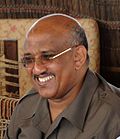| Prime Minister of Djibouti | |
|---|---|
| Premier Ministre du Djibouti (French) | |
 Coat of Arms | |
| Appointer | Ismail Omar Guelleh, as President of Djibouti |
| Inaugural holder | Ali Aref Bourhan (French territory) Hassan Gouled Aptidon (Republic of Djibouti) |
| Formation | 27 June 1977 |
| Website | primature |
 |
|---|
| |
| |
This is a list of prime ministers of Djibouti . Since the establishment of the office of prime minister in 1977, there have been 6 official prime ministers. The current prime minister is Abdoulkader Kamil Mohamed, since 1 April 2013.
Contents
The list also includes presidents of the Government Council of French Territory of the Afars and the Issas, which acted as heads of government of the area of present-day Djibouti between 1967 and 1977, before the proclamation of independence.








